|
|
|
Sort Order |
|
|
|
Items / Page
|
|
|
|
|
|
|
| Srl | Item |
| 1 |
ID:
173911
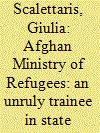

|
|
|
|
|
| Summary/Abstract |
This article looks at the interactions between the officials of the United Nations High Commissioner for Refugees (UNHCR)’s mission in Afghanistan and the heads of the Afghan Ministry of Refugees in the mid-2000s. It examines the rationales that guide officials at both the UNHCR and the ministry, as a way of unpacking the politics of state capacity building in post-2001 Afghanistan. The first section looks at the tense relationship between the two bodies from the point of view of UN officials, who strive to redress a ministry portrayed as ‘incapable’. By looking in turn at the fundaments of the political legitimacy of the Afghan state, at how international intervention transforms the Afghan political arena, and at Afghanistan’s position in global power relations, the following sections identify three rationales that can be ascribed to ministry officials, namely reconciling internal and external state legitimacy, strategic resource tapping and resistance to inter-state hegemony. From its standpoint at the juncture between an ‘external’ and a ‘local’ institution, the article ultimately stresses the importance of gaining epistemological distance from the peace building project in order to consider ‘local’ actors as full political actors.
|
|
|
|
|
|
|
|
|
|
|
|
|
|
|
|
| 2 |
ID:
119742
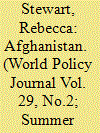

|
|
|
|
|
| Publication |
2012.
|
| Summary/Abstract |
Kabul-In the traditional pose of Afghan men, Abdul Zia sits quietly-squatting down on his haunches close to the ground. But something about Abdul Zia doesn't look like the rest of the men crouched along the streets of this capital city. Over his Pashtu turban are khaki, military-issue ear warmers. The hood of his dirty, 1970s ski jacket, likely a western cast off, is riddled with holes. His beard is grubby and matted.
|
|
|
|
|
|
|
|
|
|
|
|
|
|
|
|
| 3 |
ID:
128326
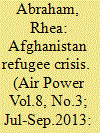

|
|
|
|
|
| Publication |
2013.
|
| Summary/Abstract |
Migration has been a regular concept in the history of Afghanistan where nomads roamed the land in search of basic necessities, while parents sent their young sons to trading centre for business and employment. Also, internal dislocation among families during conflict and tribal feuds has been a major cause of migration became predominant in and around Afghanistan with the need for development and better living standard forcing locals to migrate internally and externally. Over the years, pashtuns as the major ethnic group, spread out in large numbers, and other ethnic group, spread out in large numbers, and other ethnic groups such as the Hazaras crossed in to Iran also took place regularly, culminating in an exchange of cultural, religious and ethnic migratory routes.
|
|
|
|
|
|
|
|
|
|
|
|
|
|
|
|
| 4 |
ID:
093220


|
|
|
| 5 |
ID:
075218
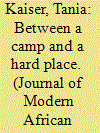

|
|
|
|
|
| Publication |
2006.
|
| Summary/Abstract |
Drawing on qualitative research with refugees in and outside formal settlements, this article challenges characterisations of Uganda's UNHCR-supported refugee settlement system as un-problematically successful. It shows that by denying refugees freedom of movement, the settlement system undermines their socio-economic and other rights. Refugees who remain outside the formal system of refugee registration and settlement are deprived of the refugee status to which they are entitled under international law. The article questions the conventional opposition between refugees living in and out of refugee settlements in the Ugandan context, revealing a more complex and interconnected dynamic than is often assumed. It suggests that those refugees with some external support may be able to escape the confines of remote rural settlements, where refugee agricultural livelihoods are seriously compromised by distance from markets, unfavourable climatic conditions, exhausted soil and inadequate inputs. It argues that refugee livelihoods face more rather than fewer challenges as exile becomes protracted, and concludes that the government and UNHCR's Self Reliance Strategy (SRS) has not yet managed to overcome the contradiction inherent in denying people freedom of movement, without supporting them effectively to meet their needs in the places to which they are restricted.
|
|
|
|
|
|
|
|
|
|
|
|
|
|
|
|
| 6 |
ID:
100948
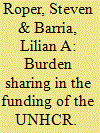

|
|
|
|
|
| Publication |
2010.
|
| Summary/Abstract |
The authors apply the theory of collective action and alliance behavior first developed by Olson and Zeckhauser and later extended by Sandler in a series of studies to test whether the nature of refugee protection influences state motivations to provide contributions. The authors investigate whether refugee protection can be viewed as a pure public good with the concomitant problem of free riding leading to suboptimal outcomes or whether contributions provide states private benefits that transform the nature of the good. Using a Heckman selection model, they test for the determinants of state contributions to the United Nations High Commissioner for Refugees and find that refugee protection offers several private benefits, indicating that it is best understood as an impure public good. They conclude, however, that even when states are able to secure these private benefits, it does not necessarily lead to the optimal provision of refugee protection.
|
|
|
|
|
|
|
|
|
|
|
|
|
|
|
|
| 7 |
ID:
069841
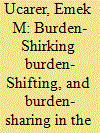

|
|
|
| 8 |
ID:
139359
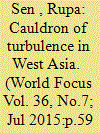

|
|
|
|
|
| Summary/Abstract |
The US occupation of Iraq in 2003 resonated the death knell of a republican, modern, secular, nationalist Iraqi state and the calibrated intention to undermine all existing solidarities by institutionalizing perennial sectarian conflicts. The Americans resolved, remaking the whole of West Asia to suit their economic and political interests, which implied the commencement of an imbroglio that would thereafter sweep the Arab world at least for a couple of decades.
|
|
|
|
|
|
|
|
|
|
|
|
|
|
|
|
| 9 |
ID:
130785
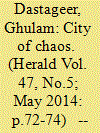

|
|
|
| 10 |
ID:
139355
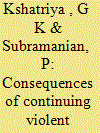

|
|
|
|
|
| Summary/Abstract |
Human beings themselves are responsible for war as the seeds of conflict are sown in their minds. When conflicts assume large proportions, the whole world gets affected by them. The situation in Iraq is beyond imagination with people’s predicament of having to face lack of food, shelter, medicines and security posing serious problems. The children in particular, who are soft targets exist in nightmarish conditions.
|
|
|
|
|
|
|
|
|
|
|
|
|
|
|
|
| 11 |
ID:
141026
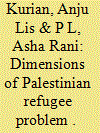

|
|
|
| 12 |
ID:
138070
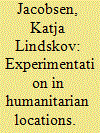

|
|
|
|
|
| Summary/Abstract |
Amid good intentions, such as providing humanitarian assistance to refugees, the use of biometric technology in humanitarian refugee management may entail various risks for the implicated refugee populations. Drawing on insights from science and technology studies, this article introduces a distinction between risks stemming from technology failure and risks stemming from successful uses of biometric technology. The article thus departs from the literature in which technology failure has been in focus by showing that analysing the effect of technology success adds an important dimension to our analysis of the range of risks that may emerge in the context of humanitarian technology uses. The usefulness of this distinction is then illustrated through an analysis of the use by the United Nations High Commissioner for Refugees (UNHCR) of iris recognition in the repatriation of Afghan refugees; besides risks of failure at the implementation stage, risks also emerged once refugees had successfully registered their biometric data with UNHCR. To recognize how humanitarian refugee biometrics produces digital refugees at risk of exposure to new forms of intrusion and insecurity, we need to appreciate how successful technology can have critical implications arising from how technology is constituted in and constitutive of social phenomena.
|
|
|
|
|
|
|
|
|
|
|
|
|
|
|
|
| 13 |
ID:
141759
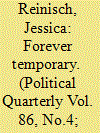

|
|
|
|
|
| Summary/Abstract |
This article examines two recent refugee crises in Calais: the debate around the Sangatte refugee camp, which was resolved in 2002, and the ongoing problems in Calais, which have been escalating since autumn 2014. It asks: why are these events repeating? What, if anything, has changed between 2002 and now? It points to a number of new developments since 2002, such as growing numbers of migrants worldwide, and a changing European political and legal landscape. But it also argues that a number of the same factors that led to the Sangatte crisis are still shaping events and responses in Calais today. They concern the persistent shortcomings of European states’ immigration controls, the failures to reach Europe-wide and international agreements on migration, and the inadequacies of international bodies such as the UNHCR and the 1951 Refugee Convention which it upholds.
|
|
|
|
|
|
|
|
|
|
|
|
|
|
|
|
| 14 |
ID:
163052
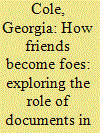

|
|
|
|
|
| Summary/Abstract |
In issuing and circulating a litany of documents, organisations produce statements with important textual and material qualities and affects. While a discursive analysis focuses on the former, interrogating how language is used, this paper propounds the need to explore the physicality of these objects too and adopts several heuristic devices to do so. First, it outlines how the issuance of certain documents within the refugee regime suppresses within a ‘black box’ the supporting and competing narratives that resulted in their genesis. Second, and relatedly, it considers why particular announcements are capable of catalysing responses that outlive their authors’ finite intentions. Tracing the genealogy of these documents is thus argued to be critical for explaining the persistent and yet unpredictable influence of ideas, interests and pressures on institutional conduct, even long after their proponents have changed tack. By illustrating why greater attention should be paid to the ways that material objects can come to shape organisational behaviour, in this case legal texts, this article complements existing theoretical frameworks used to explain UNHCR’s conduct. This helps explain how, when and why non-legally binding declarations nonetheless came to bind UNHCR’s actions as it attempted to cancel the status of Eritrean refugees in 2002.
|
|
|
|
|
|
|
|
|
|
|
|
|
|
|
|
| 15 |
ID:
128610
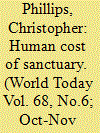

|
|
|
| 16 |
ID:
130776
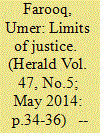

|
|
|
| 17 |
ID:
121923
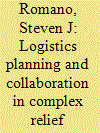

|
|
|
| 18 |
ID:
151944
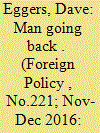

|
|
|
| 19 |
ID:
106867
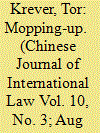

|
|
|
|
|
| Publication |
2011.
|
| Summary/Abstract |
Since the close of the Cold War, the United Nations High Commissioner for Refugees (UNHCR) has undergone a fundamental mutation, reinventing itself as a humanitarian actor, extending its activities into "countries of origin" and, most recently, providing increasing assistance to internally displaced persons. Mainstream narratives present this expansion of UNHCR activities as the realization of a humanitarian potential previously curtailed and a signal improvement in the organization's work. This article offers a critical reassessment of UNHCR's evolution and, in doing so, questions the orthodox account. It traces the curve of UNHCR's recent development to the early 1990s and argues that the use of a humanitarian discourse masks what is fundamentally a shift to policies of containment-and the pursuit of State, not refugee, interests-which have undermined UNHCR's protection mandate.
|
|
|
|
|
|
|
|
|
|
|
|
|
|
|
|
| 20 |
ID:
129125
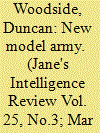

|
|
|
|
|
|
|
|